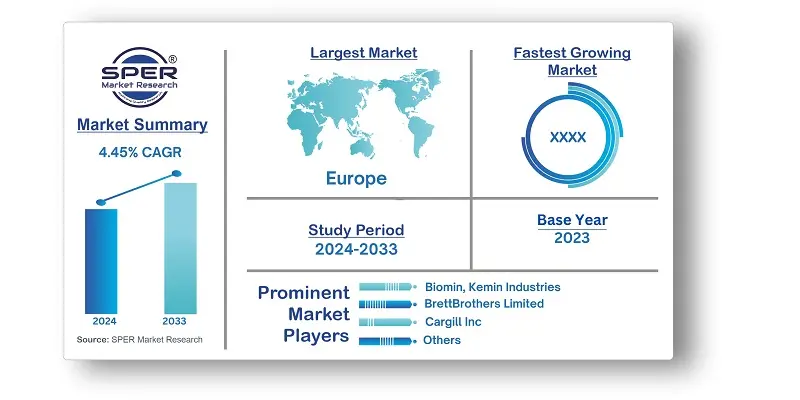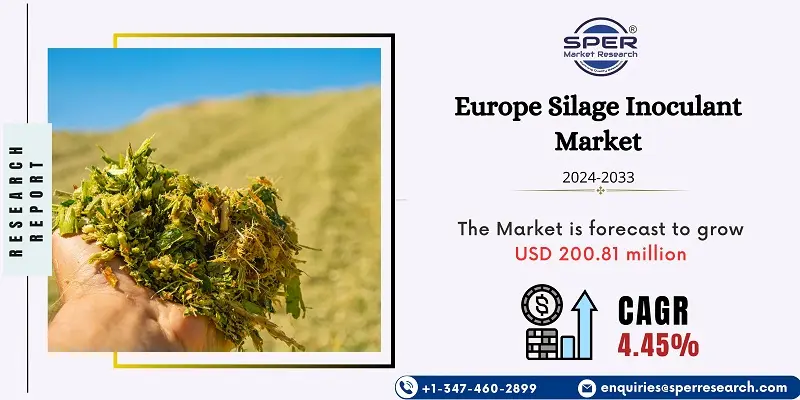
Europe Silage Inoculant Market Trends, Share, Size, Demand, Competition and Future Outlook
Europe Silage Inoculant Market Growth, Size, Trends Analysis- By Type, By Application- Regional Outlook, Competitive Strategies and Segment Forecast to 2033
| Published: Nov-2024 | Report ID: AGRI2447 | Pages: 1 - 151 | Formats*: |
| Category : Agriculture | |||
- In November 2022, Alltech announced Egalis, a new line of premium silage inoculants. Farmers are able to feed more and better silage without worrying about feed waste since it maximizes nutritional content while minimizing dry matter losses. Egalis regulates and speeds up feed fermentation with the help of highly efficient homolactic acid bacteria and antifungal growth inhibitors.
- Micron Biosystems, a leader in animal feed and agricultural products based in the United Kingdom, will offer Advanced Corn Silage Inoculant in September 2021. Advance Maize is a crop-specific silage inoculant that delivers high-quality and effective fodder preservation technology.

- Cost Constraints: The high price of these products is one of the main factors limiting the market for silage inoculants. Due to their limited financial means, farmers—particularly those in developing nations—are frequently reluctant to spend money on inputs other than the necessary fertilizers and insecticides.
- Education and Awareness: The expansion of the market is severely constrained by a lack of knowledge and understanding regarding the advantages and proper application of silage inoculants. A large number of farmers are either ignorant about silage inoculants or do not know how to use them properly to get the intended effects.

| Report Metric | Details |
| Market size available for years | 2020-2033 |
| Base year considered | 2023 |
| Forecast period | 2024-2033 |
| Segments covered | By Type, By Application |
| Regions covered | Germany, UK, France, Spain, Italy. |
| Companies Covered | ADM Alliance Nutrition, Biomin, Kemin Industries, BrettBrothers Limited, Cargill Inc, CHR. Hansen Holdings, Provita Eurotech Limited, Josera GmbH & Co. KG, Schaumann BioEnergy GmbH, Lallemand Animal Nutrition, Microferm Ltd. |
- Dairy Farmers
- Livestock Farmers
- Agricultural Cooperatives
- Silage Contractors and Custom Operators
- Agricultural Input Distributors and Retailers
- Agronomists and Farm Consultants
- Animal Nutritionists and Veterinarians
- Silage Inoculant Manufacturers and Suppliers
- Research and Academic Institutions
- Government and Agricultural Policy Makers
| By Type: | |
| By Application: | |
| By Region: |
- Europe Silage Inoculant Market Size (FY’2024-FY’2033)
- Overview of Europe Silage Inoculant Market
- Segmentation of Europe Silage Inoculant Market by Type (Homolactic bacteria, Heterolactic bacteria)
- Segmentation of Europe Silage Inoculant Market by Application (Cereals, Pulses, Oilseeds, and Other Crops)
- Statistical Snap of Europe Silage Inoculant Market
- Expansion Analysis of Europe Silage Inoculant Market
- Problems and Obstacles in Europe Silage Inoculant Market
- Competitive Landscape in Europe Silage Inoculant Market
- Impact of COVID-19 and Demonetization on Europe Silage Inoculant Market
- Details on Current Investment in Europe Silage Inoculant Market
- Competitive Analysis of Europe Silage Inoculant Market
- Prominent Players in Europe Silage Inoculant Market
- SWOT Analysis of Europe Silage Inoculant Market
- Europe Silage Inoculant Market Future Outlook and Projections (FY’2024-FY’2033)
- Recommendations from Analyst
1.1. Scope of the report1.2. Market segment analysis
2.1. Research data source
2.1.1. Secondary Data2.1.2. Primary Data2.1.3. SPER’s internal database2.1.4. Premium insight from KOL’s
2.2. Market size estimation
2.2.1. Top-down and Bottom-up approach
2.3. Data triangulation
4.1. Driver, Restraint, Opportunity and Challenges analysis
4.1.1. Drivers4.1.2. Restraints4.1.3. Opportunities4.1.4. Challenges
4.2. COVID-19 Impacts of the Europe Silage Inoculant Market.
5.1. SWOT Analysis
5.1.1. Strengths5.1.2. Weaknesses5.1.3. Opportunities5.1.4. Threats
5.2. PESTEL Analysis
5.2.1. Political Landscape5.2.2. Economic Landscape5.2.3. Social Landscape5.2.4. Technological Landscape5.2.5. Environmental Landscape5.2.6. Legal Landscape
5.3. PORTER’s Five Forces
5.3.1. Bargaining power of suppliers5.3.2. Bargaining power of buyers5.3.3. Threat of Substitute5.3.4. Threat of new entrant5.3.5. Competitive rivalry
5.4. Heat Map Analysis
6.1. Europe Silage Inoculant Market Manufacturing Base Distribution, Sales Area, Product Type6.2. Mergers & Acquisitions, Partnerships, Product Launch, and Collaboration in Europe Silage Inoculant Market
7.1. Europe Silage Inoculant Market Size, Share and Forecast, By Type, 2020-20267.2. Europe Silage Inoculant Market Size, Share and Forecast, By Type, 2027-20337.3. Homolactic bacteria7.4. Heterolactic bacteria
8.1. Europe Silage Inoculant Market Size, Share and Forecast, By Application, 2020-20268.2. Europe Silage Inoculant Market Size, Share and Forecast, By Application, 2027-20338.3. Cereal Crops8.4. Pulse Crops8.5. Oilseeds8.6. Others Crops
9.1. Europe Silage Inoculant Market Size and Market Share
10.1. Europe Silage Inoculant Market Size and Market Share By Region (2020-2026)10.2. Europe Silage Inoculant Market Size and Market Share By Region (2027-2033)10.3. Germany10.4. UK10.5. France10.6. Spain10.7. Italy
11.1. ADM Alliance Nutrition
11.1.1. Company details11.1.2. Financial outlook11.1.3. Product summary11.1.4. Recent developments
11.2. Biomin
11.2.1. Company details11.2.2. Financial outlook11.2.3. Product summary11.2.4. Recent developments
11.3. Kemin Industries
11.3.1. Company details11.3.2. Financial outlook11.3.3. Product summary11.3.4. Recent developments
11.4. BrettBrothers Limited
11.4.1. Company details11.4.2. Financial outlook11.4.3. Product summary11.4.4. Recent developments
11.5. Cargill Inc
11.5.1. Company details11.5.2. Financial outlook11.5.3. Product summary11.5.4. Recent developments
11.6. CHR. Hansen Holdings
11.6.1. Company details11.6.2. Financial outlook11.6.3. Product summary11.6.4. Recent developments
11.7. Provita Eurotech Limited
11.7.1. Company details11.7.2. Financial outlook11.7.3. Product summary11.7.4. Recent developments
11.8. Josera GmbH & Co. KG
11.8.1. Company details11.8.2. Financial outlook11.8.3. Product summary11.8.4. Recent developments
11.9. Schaumann BioEnergy GmbH
11.9.1. Company details11.9.2. Financial outlook11.9.3. Product summary11.9.4. Recent developments
11.10. Lallemand Animal Nutrition
11.10.1. Company details11.10.2. Financial outlook11.10.3. Product summary11.10.4. Recent developments
11.11. Microferm Ltd
11.11.1. Company details11.11.2. Financial outlook11.11.3. Product summary11.11.4. Recent developments
11.12. Others
SPER Market Research’s methodology uses great emphasis on primary research to ensure that the market intelligence insights are up to date, reliable and accurate. Primary interviews are done with players involved in each phase of a supply chain to analyze the market forecasting. The secondary research method is used to help you fully understand how the future markets and the spending patterns look likes.
The report is based on in-depth qualitative and quantitative analysis of the Product Market. The quantitative analysis involves the application of various projection and sampling techniques. The qualitative analysis involves primary interviews, surveys, and vendor briefings. The data gathered as a result of these processes are validated through experts opinion. Our research methodology entails an ideal mixture of primary and secondary initiatives.



Frequently Asked Questions About This Report
PLACE AN ORDER
Year End Discount
Sample Report
Pre-Purchase Inquiry
NEED CUSTOMIZATION?
Request CustomizationCALL OR EMAIL US
100% Secure Payment






Related Reports
Our Global Clients
Our data-driven insights have influenced the strategy of 200+ reputed companies across the globe.






















